Doing Inclusion, Making Strong VR Experiences
Lessons from the team behind 4 Feet: Blind Date
4 Feet: Blind Date is an Argentinian VR film about Juana, an 18-year-old who uses a power wheelchair. The film portrays Juana’s experience going to see a guy she met online. The film jumps back and forth on this timeline, alternating between scenes of Juana on her way to her date and scenes of them together in his bedroom.
I saw the VR film at the Sundance Film Festival, where its intro acts as an emotional thesis statement: Juana is in the bathtub, watching a steamy video on her phone and touching herself. The viewer is positioned a few feet away from the tub, next to Juana’s wheelchair. Cartoon petals and waves fill the scene, and then Juana’s mother interrupts the private moment by opening the bathroom door. This introduction lays out the film’s confident portrayal of disability and sexuality, its deft use of animation, and its absolute delight in awkward moments before the plot has even begun.
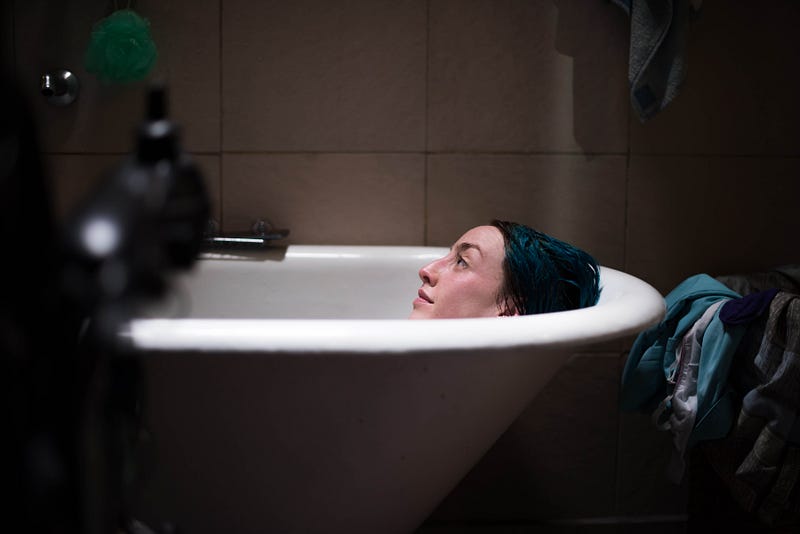 An on-set
photo of Juana’s head sticking out of the bathtub. Photo Credit: Ana Vollenweider.
An on-set
photo of Juana’s head sticking out of the bathtub. Photo Credit: Ana Vollenweider.I sat down for an interview with co-creators María Belén Poncio (Director), Rosario Perazolo Masjoan (Lead Scriptwriter), and Ezequiel Lenardón (Creative Producer). Below are highlights from our conversation that suggest what this film can teach others about inclusive media-making, as well as making a stellar VR film.
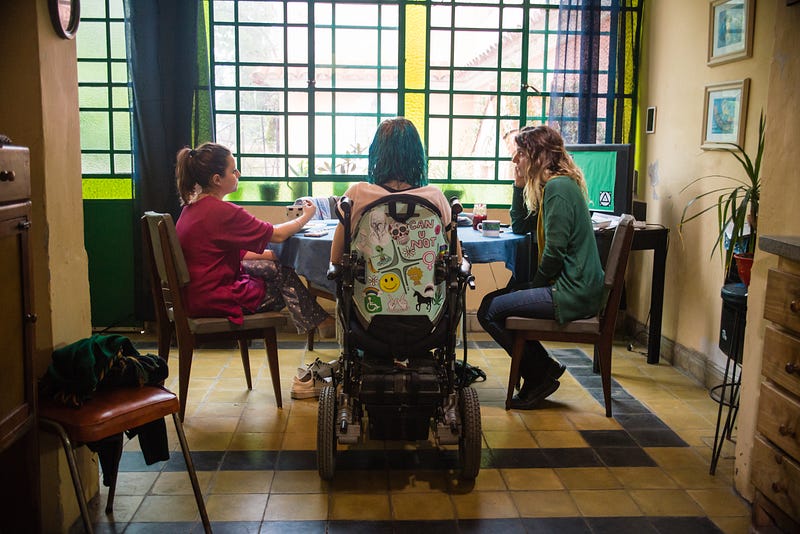 An on-set
shot of Juana at the breakfast table with her sister and mom. Photo Credit: Ana Vollenweider.
An on-set
shot of Juana at the breakfast table with her sister and mom. Photo Credit: Ana Vollenweider.
We have to talk about inclusion but do inclusion too.
—Rosario Perazolo Masjoan
Poncio, Masjoan, and Lenardón talked about how they came together to create the film. They recounted the project’s beginnings, when Lenardón approached Masjoan to make an immersive documentary following a talk she gave as part of her disability activism. The project evolved into a fiction piece, with Poncio’s directorial vision guiding the film’s voice. Poncio cites her solid relationship with Lenardón and Masjoan as an important pillar of the film’s achievements.
The team is proud of their inclusive creation process, recognizing that representation in front of the camera is not enough. The film’s strengths stem from the creative team’s leading women, with and without a disability, working together to craft a true-to-life fictional story.
Poncio and Masjoan described the process of connecting over shared experiences, while their unique experiences shaped the final outcome of the film. Poncio talked about the significance of working on her first professional project, bringing the film’s voice to life with the help of a huge team. Masjoan mentioned that the opening scene reflected her own tension between her private life and needing the people around her.
The result is a film about a fictional character who feels like she has a life of her own. She is not just a collection of the inspiration or victimhood tropes that too often plague media portrayals of people with disabilities. Blind Date’s inclusive, co-creative approach to filmmaking exemplifies the benefits of telling overlooked stories, as well as centering the voices of people who have lived those stories.
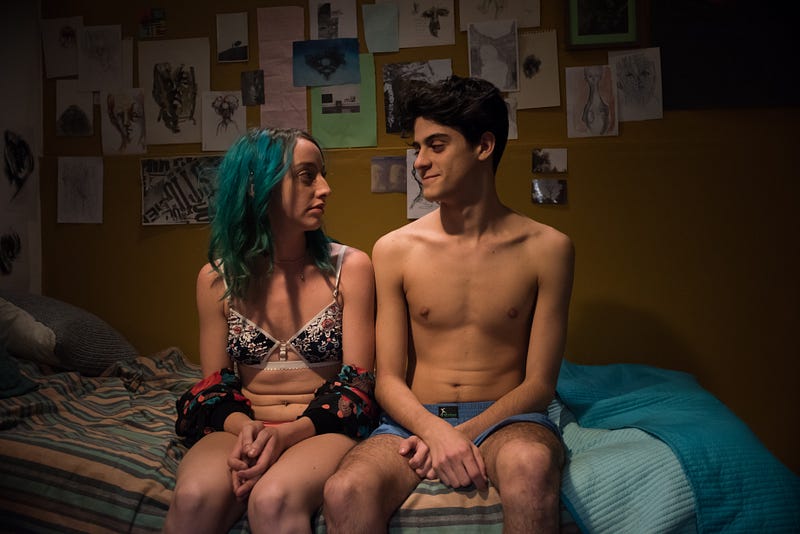
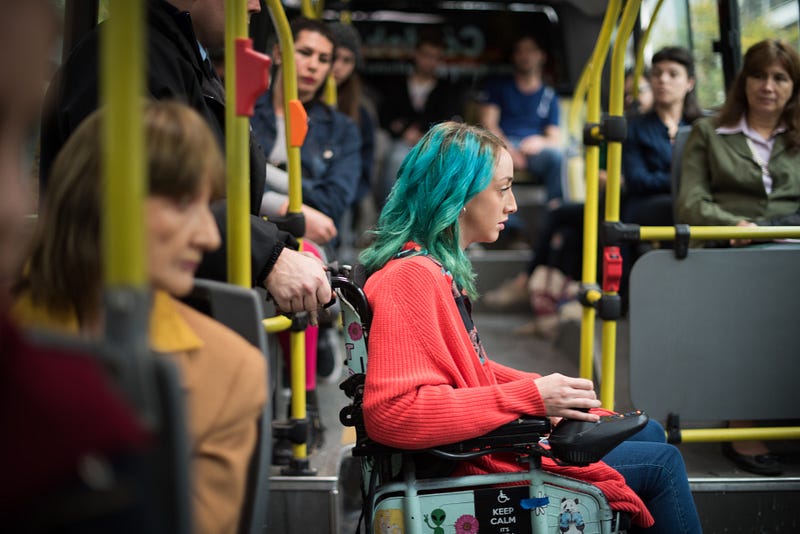 Left: An
on-set photo of Juana in bed with her date. Right: a photo of Juana being assisted off a city bus.
Photo Credit: Ana Vollenweider.
Left: An
on-set photo of Juana in bed with her date. Right: a photo of Juana being assisted off a city bus.
Photo Credit: Ana Vollenweider.We want people to feel uncomfortable and ask, “Why am I feeling uncomfortable with this?” —María Belén Poncio
Blind Date relishes in uncomfortable moments. Early in the film, Juana’s mother voices discomfort as her daughters talk about Juana’s upcoming date. Juana responds to her mom’s discomfort by shouting about how she wants to fuck the guy she met online. On the bus ride to her date, Juana has a quiet but heated exchange with a nosy stranger worrying about Juana being out on her own. The exchange ends with a painfully slow wheelchair ramp lowering into position so that Juana can transfer onto the sidewalk.
The team described feedback from viewers who felt uncomfortable with moments in the film—and the team loved that! Poncio described the film’s use of humor to point out ridiculous aspects of society, such as in Juana’s exchange with the nosy stranger on the bus. She also described her goal of making viewers reflect on any discomfort they may feel; the team members seem to have anticipated some audience responses to their treatment of disability, sexuality, and accessibility. Blind Date exemplifies the benefits of leaning into that awkwardness.
A constant pattern in the project is playing with reality. Not only making a fiction but breaking the rules of the fiction. —Ezequiel Lenardón
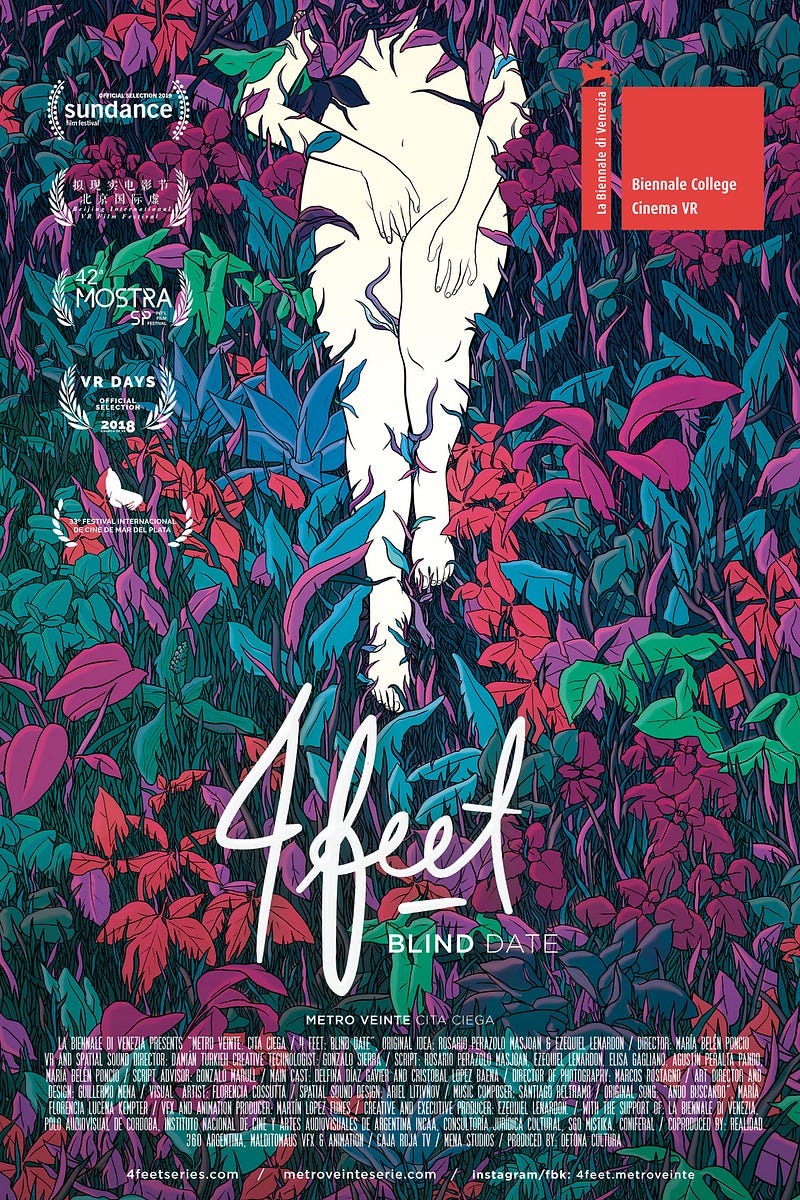 The movie
poster for “4 Feet: Blind Date”.
The movie
poster for “4 Feet: Blind Date”.On Juana’s bus ride to meet her date, lush animations of wind, waves, petals, and organic curves flow past the window with magical speed, like honey in low-gravity. Moments like this are peppered throughout the film, as Poncio notes, not just to highlight Juana’s emotions, but also to prompt viewers to question what they’re seeing. What mix of reality and Juana’s perceptions is the audience actually privy to?
Just as the team used the medium of VR to create a hybrid world, they used the tools of fiction to create a hybrid character. Juana is an amalgamation of real human experiences, as well as realistic experiences that someone probably would have in her situation. By bending some of the rules of its own fiction, the team has created a lived-in world with authentic characters. The team plans to build on this world and its success at film festivals including Venice and Sundance, with Blind Date serving as an introduction to a transmedia project series.
Immerse is an initiative of the MIT Open DocLab and The Fledgling Fund, and it receives funding from Just Films | Ford Foundation and the MacArthur Foundation. IFP is our fiscal sponsor. Learn more here. We are committed to exploring and showcasing media projects that push the boundaries of media and tackle issues of social justice — and rely on friends like you to sustain ourselves and grow. Join us by making a gift today.